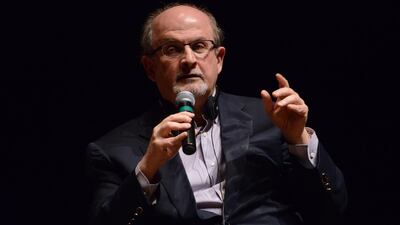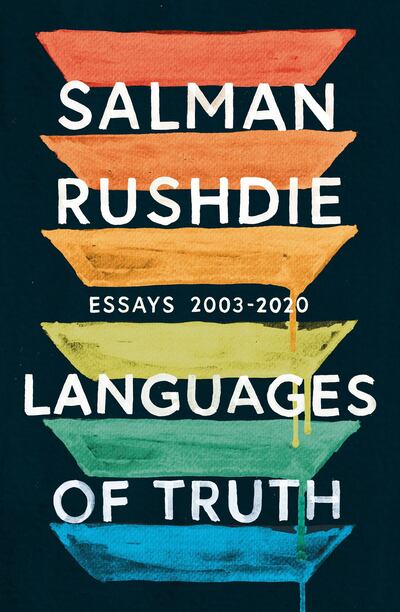The experience of reading collections of non-fiction work can often help put the topical concerns of social media and newspaper reporting into a historical perspective.
Two standout collections from the last decade have been the late Christopher Hitchens's Arguably (2011) and Zadie Smith's Feel Free (2018), which approach everything from Jay Z to Iran with the literary confidence that standard reporting rarely manages to muster. Non-fiction collections also allow authors to show off their argumentative ability in ways that novels, mostly, do not.
Salman Rushdie, the bestselling author of Midnight's Children (1981) and The Satanic Verses (1988), has just published his second non-fiction collection Languages of Truth: Essays 2003-2020. It compiles previously published essays, speeches and interviews and new writing in four separate parts.
Rushdie deals with big philosophical questions like truth, courage, liberty and the nature of stories, while also addressing pop-cultural and literary figures such as Carrie Fisher, Muhammad Ali, Philip Roth and Samuel Beckett.
Languages of Truth feels like a second act: coming after his first collection of essays, Step Across This Line: Collected Nonfiction 1992-2002. His first non-fiction offering deals with urgent topics: the fatwa announced against him by the Ayatollah Ruhollah Khomeini in 1989, the success of his novel Midnight's Children, 9/11 and the disputed election of George W Bush.
While his first collection spanned 10 years, his new book covers 17, from the start of the Iraq War to the coronavirus pandemic. The result is, sometimes, a loss of relevance. His various commencement addresses and speeches from the 2000s would have been better served in a separate collection covering that decade.
Instead, Rushdie’s essays are placed non-chronologically in the book. There are also few dates indicating when the pieces were written. Consequently, a reader never knows when Rushdie’s writing is contemporaneous or retrospective.
The first part of the collection is ambitious and addresses the big questions of literature: storytelling, truth, morals and reality, but the essays feel loose, digressive and sometimes conversational. It is often hard to follow his arguments to a convincing conclusion.
In a later essay, Autobiography and the Novel, Rushdie attacks the current fashion for real-life narratives in novels as a "self-regard [that] has never been so well regarded". Amid such "promiscuity of revelation", he asks "how can art compete?"The last essay in the first part of the book, Another Writer's Beginnings, is autobiographical and straightforward. It brilliantly describes Rushdie's struggles as a migrant, a member of an ethnic minority group and a frustrated young writer in England whose "road" to literary fame was "full of potholes." His public boarding school, Rugby, teaches him "everything" about "racism". While studying at Cambridge, however, he "discovers a tolerant Britain that erase[s]...memories of another racist one".
Rushdie is at his most engaging when he writes about current affairs and events through the prism of his own life and times
Ironically, Rushdie is at his most engaging in Languages of Truth when he writes about current affairs and events through the prism of his own life and times. This is because he has a unique perspective: he was born in Mumbai, educated at elite institutions in England and currently holds American citizenship.
This has allowed him to have a foot in both colonial and post-colonial cultures; in both the 20th and 21st centuries and the old world and the new. He also has years of experience of writing about three of the world’s most important democracies: the UK, the USA and India.
His comments on Britain’s imperial legacy are especially timely and arrive as the UK, sparked by the toppling of the slave trader Edward Colston’s statue in Bristol last year, begins to debate the meaning of its colonial history.
Rushdie's contribution to this debate has been made through his beloved novels such as Midnight's Children, Shame (1983) and Quichotte (2019). In Languages of Truth, his arguments about empire are spread across various essays.
He makes the point that Britain, and the West more broadly, still does not understand the complexity of their own or India’s history because “so much of it happened overseas”. For Rushdie, a historical example of this lack of understanding can be found in the names used by historians to describe the same event: “During the British Empire, the military revolt of 1857 was known as the ‘Indian Mutiny’, a mutiny is a rebellion against the authorities...the meaning of that fact, placed the ‘mutinying’ Indians in the wrong. Indian historians today refer to this event as the “Indian Uprising”, which makes it an entirely different sort of fact.”
He also draws interesting parallels between the exoticism of old "Western movies about India [that featured] blonde white women arriving there to find, almost at once, a maharajah to fall in love with", and Danny Boyle's Slumdog Millionaire (2009) which replaces "raj tourism" with "slum tourism".
In Languages of Truth, Rushdie is explicit about the important role the "imagination" plays in distinguishing fiction from memoir. However, the non-fiction essay's similar reliance on compelling argument doesn't seem, in this collection, to be fully realised.
When Languages of Truth does decide to offer a proper argument, we see Rushdie at his best: perceptive, funny, cosmopolitan and brave.
COMPANY PROFILE
Founders: Alhaan Ahmed, Alyina Ahmed and Maximo Tettamanzi
Total funding: Self funded
The alternatives
• Founded in 2014, Telr is a payment aggregator and gateway with an office in Silicon Oasis. It’s e-commerce entry plan costs Dh349 monthly (plus VAT). QR codes direct customers to an online payment page and merchants can generate payments through messaging apps.
• Business Bay’s Pallapay claims 40,000-plus active merchants who can invoice customers and receive payment by card. Fees range from 1.99 per cent plus Dh1 per transaction depending on payment method and location, such as online or via UAE mobile.
• Tap started in May 2013 in Kuwait, allowing Middle East businesses to bill, accept, receive and make payments online “easier, faster and smoother” via goSell and goCollect. It supports more than 10,000 merchants. Monthly fees range from US$65-100, plus card charges of 2.75-3.75 per cent and Dh1.2 per sale.
• 2checkout’s “all-in-one payment gateway and merchant account” accepts payments in 200-plus markets for 2.4-3.9 per cent, plus a Dh1.2-Dh1.8 currency conversion charge. The US provider processes online shop and mobile transactions and has 17,000-plus active digital commerce users.
• PayPal is probably the best-known online goods payment method - usually used for eBay purchases - but can be used to receive funds, providing everyone’s signed up. Costs from 2.9 per cent plus Dh1.2 per transaction.
Key facilities
- Olympic-size swimming pool with a split bulkhead for multi-use configurations, including water polo and 50m/25m training lanes
- Premier League-standard football pitch
- 400m Olympic running track
- NBA-spec basketball court with auditorium
- 600-seat auditorium
- Spaces for historical and cultural exploration
- An elevated football field that doubles as a helipad
- Specialist robotics and science laboratories
- AR and VR-enabled learning centres
- Disruption Lab and Research Centre for developing entrepreneurial skills
HWJN
%3Cp%3EDirector%3A%20Yasir%20Alyasiri%3C%2Fp%3E%0A%3Cp%3EStarring%3A%20Baraa%20Alem%2C%20Nour%20Alkhadra%2C%20Alanoud%20Saud%3C%2Fp%3E%0A%3Cp%3ERating%3A%203%2F5%3C%2Fp%3E%0A%3Cp%3E%3C%2Fp%3E%0A
UAE currency: the story behind the money in your pockets
UAE currency: the story behind the money in your pockets
Wicked: For Good
Director: Jon M Chu
Starring: Ariana Grande, Cynthia Erivo, Jonathan Bailey, Jeff Goldblum, Michelle Yeoh, Ethan Slater
Rating: 4/5
Labour dispute
The insured employee may still file an ILOE claim even if a labour dispute is ongoing post termination, but the insurer may suspend or reject payment, until the courts resolve the dispute, especially if the reason for termination is contested. The outcome of the labour court proceedings can directly affect eligibility.
- Abdullah Ishnaneh, Partner, BSA Law
Director: Shady Ali
Cast: Boumi Fouad , Mohamed Tharout and Hisham Ismael
Rating: 3/5
UAE currency: the story behind the money in your pockets
The%20US%20Congress%20explained
%3Cp%3E-%20Congress%20is%20one%20of%20three%20branches%20of%20the%20US%20government%2C%20and%20the%20one%20that%20creates%20the%20nation's%20federal%20laws%3C%2Fp%3E%0A%3Cp%3E-%20Congress%20is%20divided%20into%20two%20chambers%3A%20The%20House%20of%20Representatives%20and%20the%20Senate%3C%2Fp%3E%0A%3Cp%3E-%C2%A0The%20House%20is%20made%20up%20of%20435%20members%20based%20on%20a%20state's%20population.%20House%20members%20are%20up%20for%20election%20every%20two%20years%3C%2Fp%3E%0A%3Cp%3E-%20A%20bill%20must%20be%20approved%20by%20both%20the%20House%20and%20Senate%20before%20it%20goes%20to%20the%20president's%20desk%20for%20signature%3C%2Fp%3E%0A%3Cp%3E-%20A%20political%20party%20needs%20218%20seats%20to%20be%20in%20control%20of%20the%20House%20of%20Representatives%3C%2Fp%3E%0A%3Cp%3E-%20The%20Senate%20is%20comprised%20of%20100%20members%2C%20with%20each%20state%20receiving%20two%20senators.%20Senate%20members%20serve%20six-year%20terms%3C%2Fp%3E%0A%3Cp%3E-%20A%20political%20party%20needs%2051%20seats%20to%20control%20the%20Senate.%20In%20the%20case%20of%20a%2050-50%20tie%2C%20the%20party%20of%20the%20president%20controls%20the%20Senate%3C%2Fp%3E%0A
New UK refugee system
- A new “core protection” for refugees moving from permanent to a more basic, temporary protection
- Shortened leave to remain - refugees will receive 30 months instead of five years
- A longer path to settlement with no indefinite settled status until a refugee has spent 20 years in Britain
- To encourage refugees to integrate the government will encourage them to out of the core protection route wherever possible.
- Under core protection there will be no automatic right to family reunion
- Refugees will have a reduced right to public funds
Name: Brendalle Belaza
From: Crossing Rubber, Philippines
Arrived in the UAE: 2007
Favourite place in Abu Dhabi: NYUAD campus
Favourite photography style: Street photography
Favourite book: Harry Potter
Anghami
Started: December 2011
Co-founders: Elie Habib, Eddy Maroun
Based: Beirut and Dubai
Sector: Entertainment
Size: 85 employees
Stage: Series C
Investors: MEVP, du, Mobily, MBC, Samena Capital
Other acts on the Jazz Garden bill
Sharrie Williams
The American singer is hugely respected in blues circles due to her passionate vocals and songwriting. Born and raised in Michigan, Williams began recording and touring as a teenage gospel singer. Her career took off with the blues band The Wiseguys. Such was the acclaim of their live shows that they toured throughout Europe and in Africa. As a solo artist, Williams has also collaborated with the likes of the late Dizzy Gillespie, Van Morrison and Mavis Staples.
Lin Rountree
An accomplished smooth jazz artist who blends his chilled approach with R‘n’B. Trained at the Duke Ellington School of the Arts in Washington, DC, Rountree formed his own band in 2004. He has also recorded with the likes of Kem, Dwele and Conya Doss. He comes to Dubai on the back of his new single Pass The Groove, from his forthcoming 2018 album Stronger Still, which may follow his five previous solo albums in cracking the top 10 of the US jazz charts.
Anita Williams
Dubai-based singer Anita Williams will open the night with a set of covers and swing, jazz and blues standards that made her an in-demand singer across the emirate. The Irish singer has been performing in Dubai since 2008 at venues such as MusicHall and Voda Bar. Her Jazz Garden appearance is career highlight as she will use the event to perform the original song Big Blue Eyes, the single from her debut solo album, due for release soon.
The Greatest Royal Rumble card as it stands
The Greatest Royal Rumble card as it stands
50-man Royal Rumble - names entered so far include Braun Strowman, Daniel Bryan, Kurt Angle, Big Show, Kane, Chris Jericho, The New Day and Elias
Universal Championship Brock Lesnar (champion) v Roman Reigns in a steel cage match
WWE World Heavyweight ChampionshipAJ Styles (champion) v Shinsuke Nakamura
Intercontinental Championship Seth Rollins (champion) v The Miz v Finn Balor v Samoa Joe
United States Championship Jeff Hardy (champion) v Jinder Mahal
SmackDown Tag Team Championship The Bludgeon Brothers (champions) v The Usos
Raw Tag Team Championship (currently vacant) Cesaro and Sheamus v Matt Hardy and Bray Wyatt
Casket match The Undertaker v Chris Jericho
Singles match John Cena v Triple H
Cruiserweight Championship Cedric Alexander v tba
The Pope's itinerary
Sunday, February 3, 2019 - Rome to Abu Dhabi
1pm: departure by plane from Rome / Fiumicino to Abu Dhabi
10pm: arrival at Abu Dhabi Presidential Airport
Monday, February 4
12pm: welcome ceremony at the main entrance of the Presidential Palace
12.20pm: visit Abu Dhabi Crown Prince at Presidential Palace
5pm: private meeting with Muslim Council of Elders at Sheikh Zayed Grand Mosque
6.10pm: Inter-religious in the Founder's Memorial
Tuesday, February 5 - Abu Dhabi to Rome
9.15am: private visit to undisclosed cathedral
10.30am: public mass at Zayed Sports City – with a homily by Pope Francis
12.40pm: farewell at Abu Dhabi Presidential Airport
1pm: departure by plane to Rome
5pm: arrival at the Rome / Ciampino International Airport
Company Profile:
Name: The Protein Bakeshop
Date of start: 2013
Founders: Rashi Chowdhary and Saad Umerani
Based: Dubai
Size, number of employees: 12
Funding/investors: $400,000 (2018)


